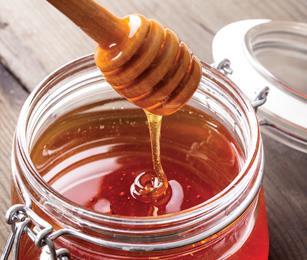
The sweet stuff is bursting with goodness, so stir it into drinks and spread it on your toast – or even on yourself, says Catherine Francis
1 As an immune booster
Honey is bursting with vitamins and minerals, including vitamins B and C, copper, potassium, manganese, iron and calcium. It’s also rich in amino acids, healthy enzymes and antioxidants – all of which strengthen your immune system and help ward off colds and bugs. For a daily immunity boost, spread it on wholemeal toast or stir one teaspoon into warm water and lemon juice for a morning cleanser. (Babies under the age of one should not be given honey, due to a low risk of botulism.)
2 To reduce hay fever symptoms
Many people swear by local, unprocessed honey to beat hay fever. That’s because it contains traces of local pollen, which may desensitise your body and build up resistance to the allergens that trigger sneezing, stuffiness and itchy, runny eyes. Look for local honey at farmers’ markets or farm shops, or look online for local beekeepers. Take one tablespoon of honey a day for several weeks before your hay fever season begins.
3 For beautiful skin
Honey has been used for millennia as a beauty treatment, thanks to its antibacterial and humectant (moisture-retaining) qualities. It’s especially good for sensitive skin that doesn’t respond well to chemical products. Try a homemade face mask – mix one tablespoon of honey with two tablespoons of live yogurt, and enough oatmeal to thicken it. Smooth over your face and leave for 10 minutes. Scrub gently to exfoliate, then remove with warm water. You can also spread honey on chapped lips to heal and protect them, and add it to your bath for a soothing soak. Try dabbing it on spots, too – its hydrogen peroxide content and antibacterial properties help to counter the bacteria that can lead to infection and inflammation.
4 To heal burns, wounds and ulcers
Honey is traditionally used to soothe burns as it reduces blistering and speeds healing by drawing in nutrients to enhance cell growth. A review of clinical research found honey can actually reduce healing times in burns compared to conventional treatments. For wounds and ulcers, honey’s soothing, antibacterial properties can help to clear infection, reduce inflammation and minimise scarring. Apply to minor burns and wounds, cover with a sterile dressing, and change daily. (For serious burns and wounds, always seek medical advice.) It’s good for sunburn, too.
5 As a throat soother
Singers commonly use honey to soothe their throats, and studies show it can be more effective than cough medicines for easing a sore throat and reducing a cough. Thanks to its antimicrobial and antibacterial properties, honey can also help to kill certain bacteria that cause infections. So pass on the honey-flavoured lozenges and go straight to the source. If you prefer, you can gargle with it – mix 2 tablespoons of honey into warm water with four tablespoons of lemon juice and a pinch of salt.
Choose the best
For the best healing qualities opt for manuka honey from New Zealand and Australia – this ‘superfood’ is extra rich in nutrients and antibacterial properties. Go for organic whenever possible and look for raw honey, which hasn’t been heat-treated or pasteurised.





























